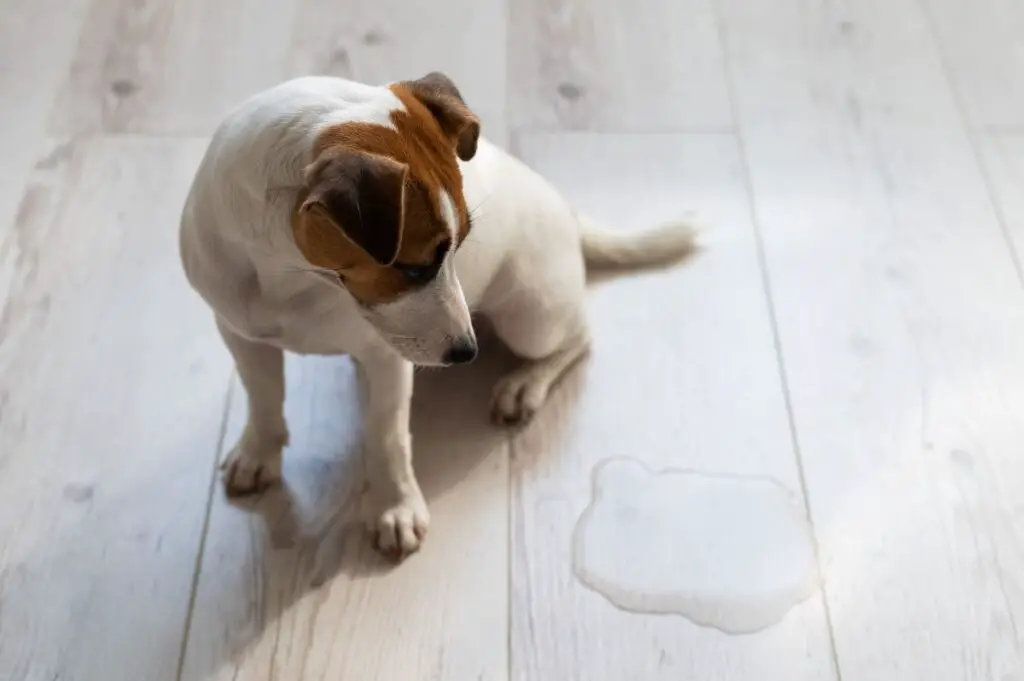Do you find yourself asking, “Why does my dog pee on my bed?” Many dog owners have experienced the frustration of finding their bed soaked in urine. One may wonder why their beloved furry friend chooses this particular spot for such an accident.
Well, there are several reasons why dogs may pee on their owner’s bed, and understanding this behavior can help pet parents address the issue effectively.

Behavioral Reasons for Dog Bed Wetting
1. Territorial Marking
Dogs are known for their natural instinct to mark their territory. This behavior often involves urinating in specific areas to leave their scent as a signal to other dogs.
When a dog pees on your bed, it could be their way of marking the area around them with their scent. This shows the dog’s attachment to a particular space and indicates that they consider it as part of their territory.
2. Anxiety and Stress-Related Causes
Anxiety and stress can also lead to dogs peeing on your bed. Dogs may experience anxiety due to a change in their environment, being left alone for long periods, or even sensing tension in their owners.
When dogs are stressed or anxious, they might accidentally release urine as a coping mechanism. If you notice this behavior consistently, it’s essential to identify and address the underlying cause of your dog’s anxiety to help prevent further accidents.
3. Excitement and Fear Urination
Dogs may also urinate on the bed due to excitement or fear. Excitement urination usually happens when a dog is overly enthusiastic, like during playtime or when greeting their owner after a long day.
On the other hand, fearful urination may occur when a dog feels threatened or scared by loud noises, unfamiliar people, or a change in their routine. Identifying the triggers causing a pet to feel excited or frightened is crucial in reducing these instances.

Furthermore, recognizing your dog’s behavior and keeping a calm demeanor during these situations can help minimize excitement or fear-induced urination on the bed.
Medical Reasons for Bed-Peeing
4. Incontinence
There are several medical reasons that could lead to a dog peeing on the bed. One common cause is incontinence, which can cause your dog to dribble urine while sleeping on the bed. Although this issue typically affects elderly dogs, it can impact dogs of any age.
5. Urinary Tract Infections
Urinary tract infections (UTIs) are another medical issue that may lead to bed-peeing accidents. A dog suffering from a UTI may experience a frequent and urgent need to urinate, making it difficult for them to control where they eliminate. In some cases, bed-peeing can be an early indicator of such an infection.
6. Kidney Disease
Kidney disease and diabetes can also lead to a dog urinating on the bed. Both of these conditions can cause an increased need to urinate, resulting in a higher likelihood of accidents.

Early detection and treatment are crucial for managing these medical issues, so it’s important to consult with a veterinarian if you suspect your dog may be suffering from either condition.
7. Bladder Stones
Bladder stones and urinary tract crystals can cause irritation and inflammation in the urinary tract, leading to pain and discomfort. As a result, your dog may have difficulty holding their urine and might end up peeing on the bed. In some cases, surgical removal of bladder stones or targeted medications may be necessary.
8. Urinary Tract Tumors
Another potential cause of bed-peeing is tumors in the urinary tract, which might obstruct urine flow and cause incontinence. In such cases, a proper diagnosis from a veterinarian and appropriate treatment, potentially including surgery, can help resolve the issue.
Training and Environment Factors
Proper training and maintaining a suitable environment both play crucial roles in preventing your dog from peeing on your bed.
Potty Training
Firstly, potty training should be prioritized when bringing a new puppy or dog into your home. Establish a consistent routine by taking them out to designated spots for eliminating at regular intervals throughout the day, ideally after eating, drinking, or playing.
Positive reinforcement, such as praising your dog or giving them a treat, can effectively teach them to urinate outdoors or on designated absorbent pads.
Crate Training
Crate training is another useful technique to discourage peeing on the bed. Providing a comfortable crate for your dog to sleep in helps them learn to hold their bladders until they are taken outside.

It also creates a safe environment for them to sleep in, reducing the likelihood of accidents caused by stress or fear. Remember to ensure the crate is the correct size for your dog, allowing them enough room to stand and move around comfortably.
Environmental Factors
Environmental factors such as the cleanliness and comfort of your dog’s sleeping area also contribute to their likelihood of peeing on the bed.
Make sure to regularly clean and sanitize your dog’s bedding, as lingering urine odors could encourage repeat behavior. Additionally, use an appropriate enzymatic cleaner to eliminate any traces of dog urine on your bed.
Prevention and Solutions
First and foremost, consult a veterinarian if your dog is peeing on the bed. They can help rule out medical issues such as urinary tract infections, kidney problems, or bladder stones. Treating any underlying medical conditions will be essential in resolving this behavior.
Consider Age
For puppies who haven’t yet mastered control of their bladder, patience and consistent training are crucial. Puppies typically need time to develop bladder control.
Therefore, nurturing them with love and understanding helps. Gradually they will learn proper potty habits, and accidents on the bed should decrease.
Consider Physical Comfort
One factor to consider when trying to prevent bed wetting in dogs is their comfort. Providing a separate, comfortable resting area for your dog can decrease their desire to mix their scent with yours, which can lead to them urinating on your bed.
Make sure the dog’s sleeping area is warm, cozy, and secure, as this will help them establish a separate space for themselves.
Consider Emotional Stress
Anxiety can be another reason for dogs to pee on the bed. Stressful situations such as thunderstorms, fireworks, or being left alone can trigger this behavior.

To address anxiety, try to create a calm and comfortable environment for your dog during these events. You can also consider using calming products or seeking professional guidance for training and behavioral modification techniques.
Consider Reproductive Status
Intact dogs, or those that have not been spayed or neutered, may be more prone to marking their territory by urinating in various places, including the bed. Spaying or neutering your dog can help prevent this behavior and contribute to a more balanced temperament.
Punishment should be avoided when dealing with this issue. Instead, reinforce good behavior and redirect your dog when they show signs of wanting to urinate on the bed. Encouraging them to use an appropriate spot and rewarding them for doing so can go a long way in resolving this issue.
Frequently Asked Questions
How to prevent a dog from urinating on the bed?
To prevent a dog from urinating on the bed, establish a consistent bathroom routine and ensure the dog gets regular opportunities to relieve itself outdoors. Make sure your dog’s sleeping area is clean and comfortable, and consider using a waterproof cover on the bed for added protection.
What causes sudden bedwetting in female dogs?
Sudden bedwetting in female dogs can be caused by various factors, such as urinary tract infections, bladder stones, or hormonal imbalances.
In elderly dogs, incontinence may occur due to weakened bladder muscles. If your female dog suddenly starts wetting the bed, consult with a veterinarian to identify any underlying medical issues.
What causes sudden bedwetting in male dogs?
In male dogs, sudden bedwetting can also result from medical issues like urinary tract infections, bladder stones, or prostate problems. Behavioral factors, such as changes in routine, stress, or anxiety, can also contribute to bedwetting. Consult a vet if your male dog suddenly starts wetting the bed.
Why does my dog pee on my bed at night?
Dogs may urinate on the bed at night for various reasons. Medical issues, such as incontinence, or anxiety-related factors can cause nighttime bedwetting. In some cases, dogs might not have sufficient opportunities to relieve themselves before bedtime, leading to accidents during the night.
Is it common for dogs to pee on beds while asleep?
Although it is not extremely common, it can happen in some cases—particularly in dogs struggling with incontinence or other medical conditions.
In young puppies, accidents during sleep may occur until they are fully housebroken. Senior dogs are more likely to struggle with incontinence, especially while sleeping.
How to address a bedwetting dog?
To address a bedwetting dog, first consult with a veterinarian to rule out any underlying medical issues.
If the vet finds no health concerns, consider implementing behavioral interventions, such as adjusting the dog’s bedtime routine, offering more bathroom breaks, or addressing any potential sources of stress or anxiety.
Additionally, you may want to use washable or waterproof bed covers to protect the sleeping area.
Wrapping up Why Your Dog Pees on Your Bed
Dogs may urinate on the bed for various reasons, including medical issues, anxiety, instinctive scent-mixing, marking their territory, or lack of bladder control. It is essential to pinpoint the root cause and take the appropriate steps to either manage the issue or prevent it from happening in the future.
Knowing the different factors that contribute to this behavior can significantly improve pet-owner relationships and ensure a cleaner, more harmonious living environment.
Get more health and training tips from All Paws!


